When I started my first vegetable patch, I quickly realized I had a lot to learn about farming. I spent significant time reading and studying the fundamentals of growing my own vegetables.
I found the science behind cucumbers becoming bitter very interesting.
The reason your cucumbers are bitter is due to their high amount of cucurbitacin. Cucumbers produce cucurbitacin because of unfavorable weather conditions, a lack of nutrients, and as a defense against pests that try to eat them.
Continue reading to find out why cucumbers become bitter and how to prevent bitterness in your crop.
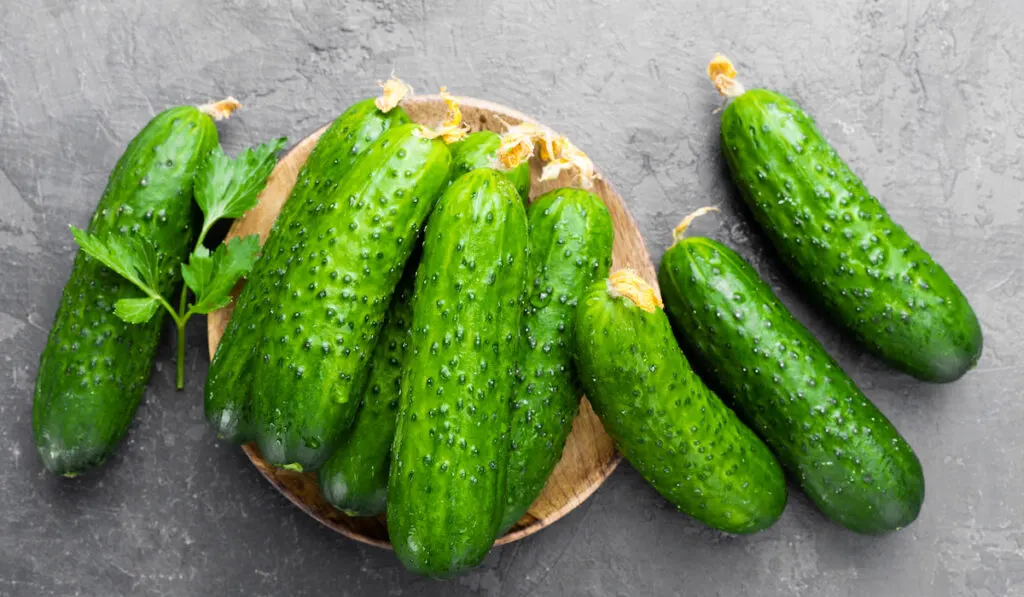
Table of Contents
Why Are Cucumbers Bitter?
The amount of cucurbitacin in your cucumbers directly relates to how bitter they taste.
Here are the top three reasons why a cucumber’s cucurbitacin levels rise:
- Unfavorable weather conditions
- Lack of nutrients
- Pests
Unfavorable Weather Conditions
Unfavorable weather conditions stress cucumbers and cause them to become bitter; after all, they are living organisms. The more stressed a cucumber gets, the more it produces cucurbitacin to protect itself.
Cucumbers are stressed when the temperature is too hot or cold, when there is too much or too little sunlight, or when water levels are inconsistent.
As a result, cucurbitacin levels rise in your cucumbers, and you end up with a bitter taste when you bite into them.
The following factors have a particularly negative impact on the taste of cucumbers:
- Drought and lack of regular watering
- Strong solar radiation
- Not enough sunlight
- Large temperature jumps between day and night
- Insect attacks (for example, aphids)
- Too low or too high soil pH
Cucumber bitterness is typically a concern for field crops. Crops grown under cover are generally given more care and attention and suffer fewer weather-related effects than outside crops.
Lack of Nutrients
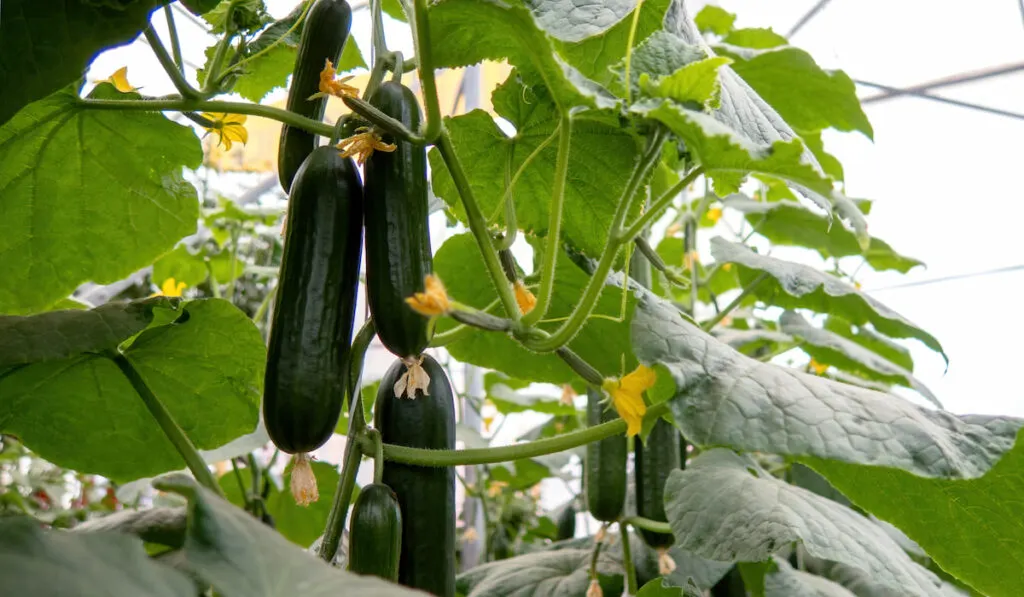
Bitter-tasting cucumbers may be caused by a lack of nutrients.
If the soil where you wish to plant cucumber seeds is low in minerals, it’s best to use fertilizer beforehand.
When fertilizing, take care to avoid making any mistakes. Too much, too little, or the wrong kind of fertilizer will hurt your crops.
When figuring out what your soil needs, it’s always a good idea to consult an expert. And always remember to follow the instructions on the fertilizer container.
Pests
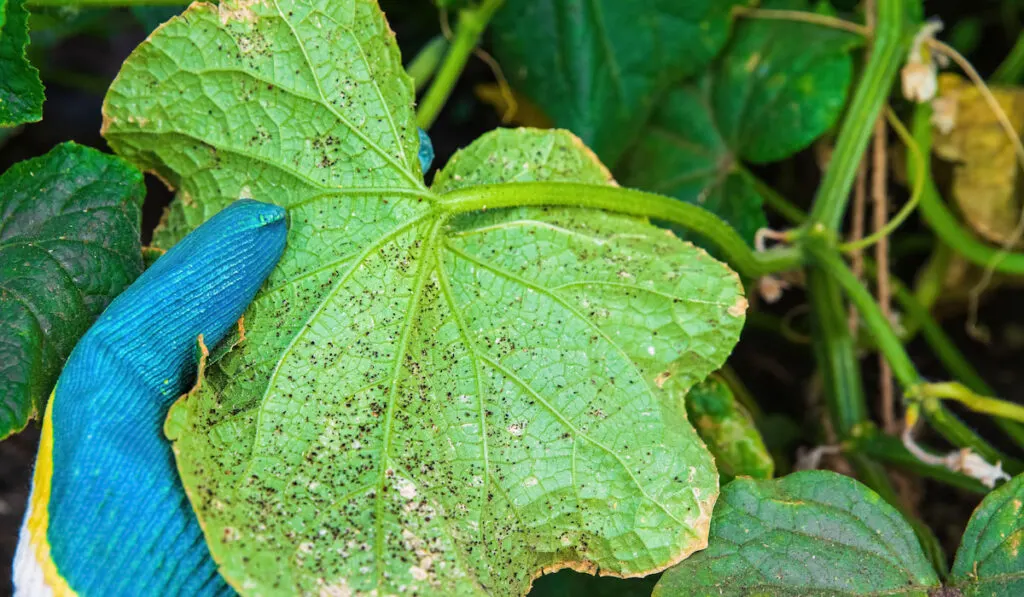
Cucurbitacins are a plant’s natural defense mechanism against insects and pests that try to eat them.
Aphids, whiteflies, cucumber beetles, and thrips love to feast on cucumbers. As a result, the cucumber plant experiences stress and responds by producing more cucurbitacin.
Cucurbitacins are found in cucumbers’ stems, leaves, and roots, making the plant less appealing to pests above or below the ground.
Consider using pest control measures to ensure that your cucumbers taste pleasant.
If you prefer not to use chemicals, here are some natural deterrents to plant next to your cucumbers to help keep those nasty pests at bay!
- Mint
- Lavender
- Calendula
- Wormwood
- Thyme
- Bulb garlic
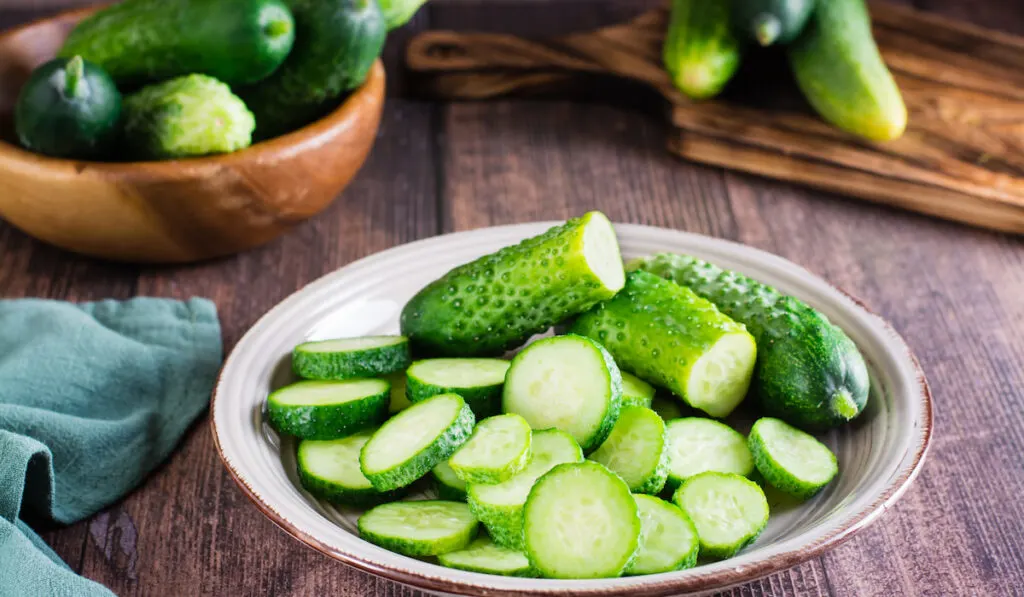
Are Bitter Cucumbers Safe to Eat?
Bitter cucumbers are not harmful. What’s more, bitter cucumbers can have a health-promoting effect on the human body.
Bitter cucumbers help the digestive tract work well and bring blood sugar levels back to normal. They also have analgesic and anti-inflammatory effects.
Surprisingly, bitter cucumbers may even strengthen heart muscle and stop the growth of cancer cells.
Bitter cucumbers are also part of a healthy diet that Chinese medicine experts suggest can help the stomach and spleen function better.
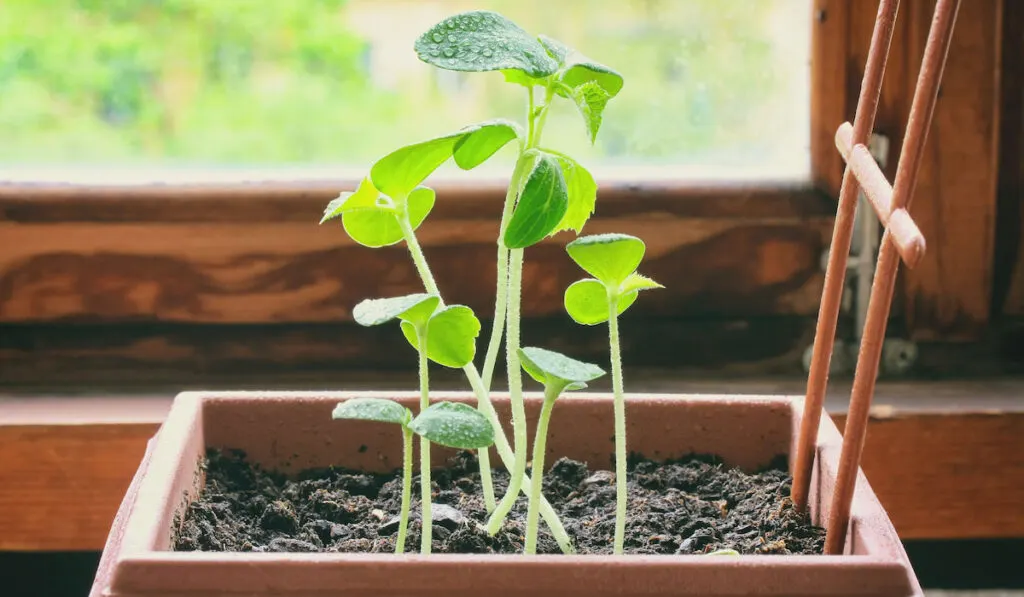
How to Stop Cucumbers From Being Bitter
To stop cucumbers from being bitter, take advantage of the advice of experienced farmers from the list below:
- Choose bitter-free seeds (refer to table below).
- If you can, start cucumber seeds inside until you can plant small seedlings outside. This will make the plant stronger and more resistant.
- Take care of fertilization – cucumbers require nutrient-rich soil.
- Cucumbers need moist soil. Watering lightly and frequently is best.
- The soil supporting the cucumbers must always be slightly moist.
- If you can’t water cucumbers for several days, use hydrogel. It stores water during watering and releases it during drought.
- At the start of growth, water the plant moderately every two to three days.
- During flowering and fruiting, each bush needs 1 quart (1 liter) of water daily.
- In hot weather, the size of the fruit increases rapidly. Keep the soil moist.
- Prevent pests.
- Pick fruit regularly – overgrown cucumbers can be bitter and dry.
Are Cucumbers Bitter When Not Ripe?
Young cucumber fruits are rarely bitter, even when grown in unfavorable conditions. Moreover, baby cucumbers can be tastier, crunchier, and free of hard seeds.
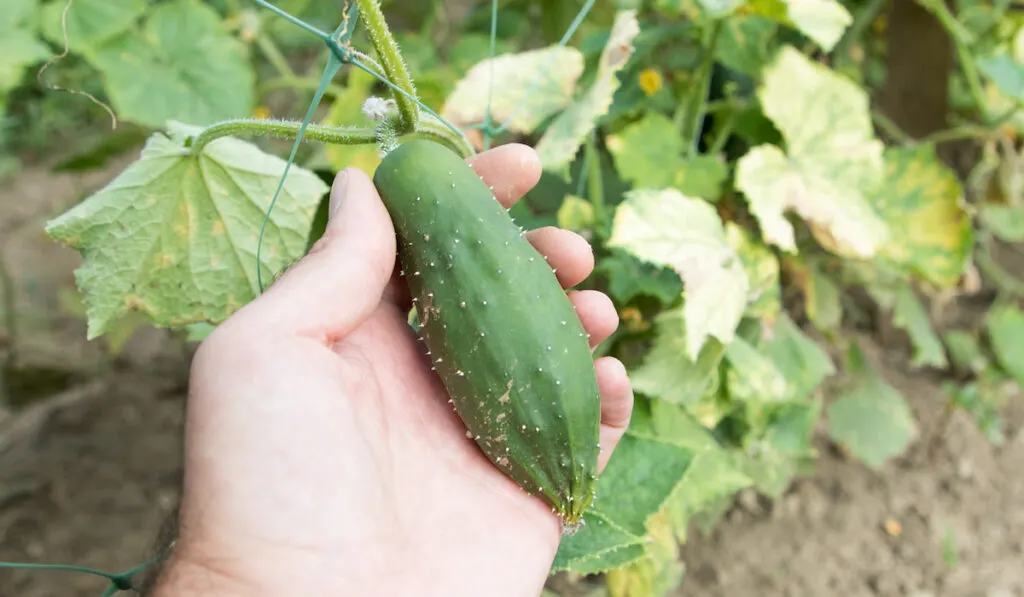
How to Identify Bitter Cucumbers
Unfortunately, you can’t determine if a cucumber is bitter simply by looking at it.
Sometimes, cucumbers with more irregular shapes may turn out to be more bitter. Also, larger cucumbers with yellow streaks toward the ends may be more bitter, depending on the variety.
The only sure way to know if a cucumber is bitter is to taste it.
Non-bitter Cucumber Varieties
Choosing a suitable variety of cucumber is an important aspect of its taste. Non-bitter varieties have significantly fewer bitter compounds.
Thanks to the work of gardeners and scientists in lowering cucurbitacin in cucumbers, you can now choose from a variety of non-bitter cucumber species.
Non-bitter cucumber seeds are labeled “bitter free” or “burpless” on their packaging.
Some bitter-free cucumbers are All-America Selection Winners.
AAS Winners are non-GMO plants with outstanding garden performance in AAS trials across North America.
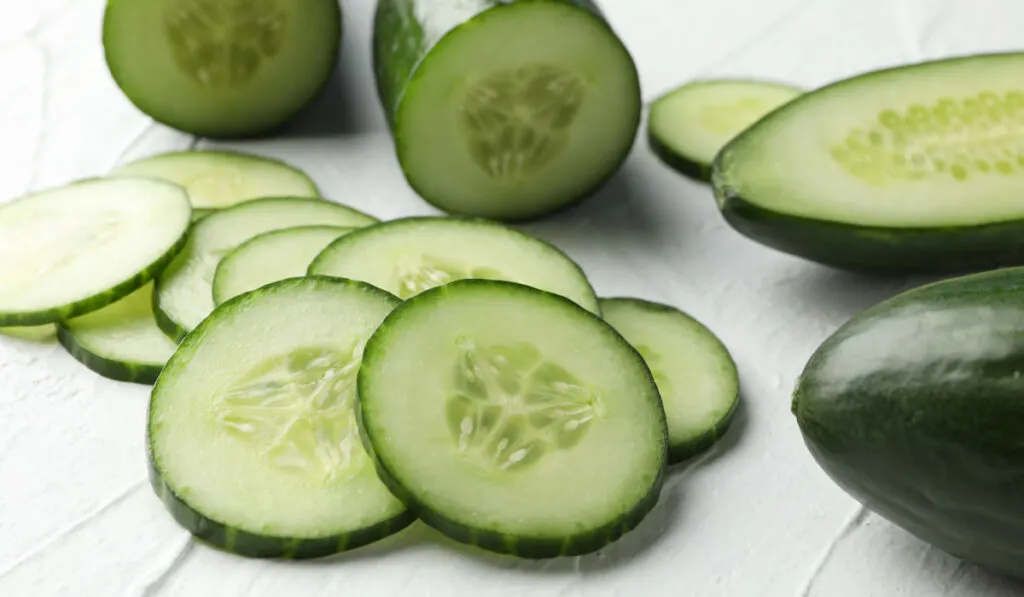
Bitter-Free Cucumber Varieties:
| Variety | Characteristics | Days to Maturity |
| Diva | AAS Winner in the year 2002 4- to 5-inch fruit. Almost seedless and not bitter. Smooth, thin, spineless skin that doesn’t need peeling | 55-58 |
| Fanfare | AAS Winner in the year 1994 8- to 9-inch fruit | 52-63 |
| Sweet Success | AAS Winner in the year 1983 12-inch fruits. Grown in greenhouses | 58 |
| Garden Sweet | 10- to 12-inch fruit. Vigorous plants | 55 |
| Sweet Slice | 6- to 8-inch fruit. Straight fruit. Non-bitter, tender-skinned | 62-65 |
| Sweeter Yet | 10- to 12-inch fruit. Grows on semi-bush plants | 45-50 |
| Tasty Green | 9- to 20-inch fruit. Mild, slightly curved, smooth-skinned | 57-62 |
(source)
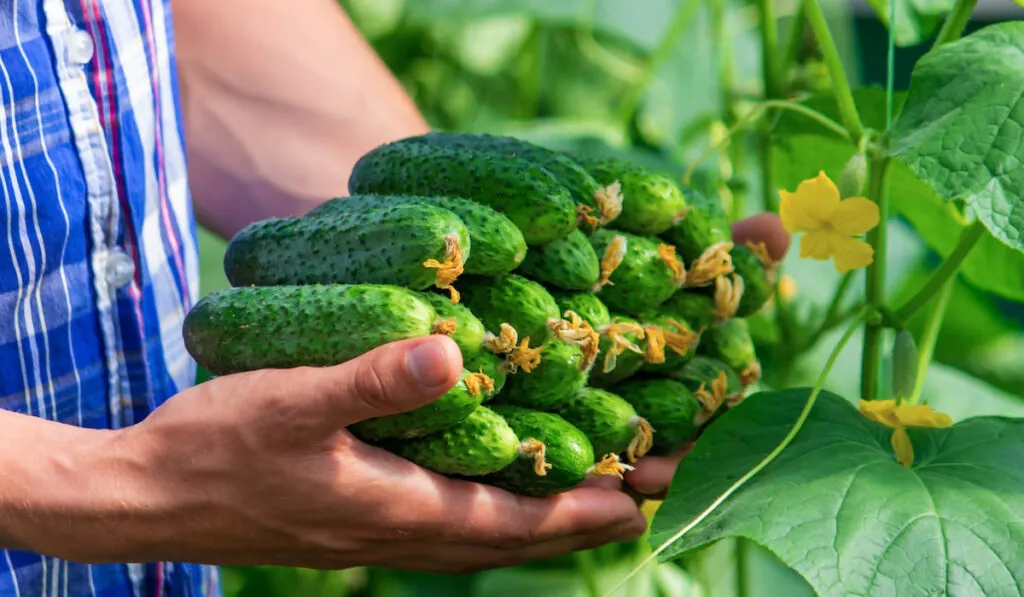
Summary
The conditions under which cucumber plants grow determine the fruit’s flavor.
When cucumbers grow in dry, poor soil or are attacked by pests, they are more likely to taste bitter.
It is also important to choose the right seeds to ensure a pleasant taste. Cucumber seeds labeled “not bitter” will guarantee less bitter fruit.
Resources
- https://www.sciencedirect.com/science/article/abs/pii/S089990072030071X
- http://www.ipm.ucdavis.edu/IPMPROJECT/ADS/manual_gardenfarms.html
- https://ccmg.ucanr.edu/files/114934.pdf
- https://link.springer.com/article/10.1186/s13020-019-0270-9
- https://extension.oregonstate.edu/news/cucumber-bitterness-explained
- https://www.purdue.edu/hla/sites/yardandgarden/cucumbers-bitter-during-hot-dry-weather/
